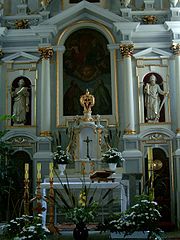
A History Of The Mass And Its Ceremonies In The Eastern And Western Church -Rev John O'Brien A.M.
DAYS UPON WHICH MASS IS NOT CELEBRATED
From time immemorial it has been customary in the Latin Church to abstain from celebrating regular Mass on Good Friday, from the fact, that it is the great mourning day of the year, and in a regular Mass there is more or less rejoicing; and also because, as St. Thomas Aquinas says (p. 3, q. 83, art. 2), it is not becoming to represent the Passion of Christ mystically by the consecration of the Eucharist whilst the Church is celebrating it as if really happening.
Those who follow the Ambrosian rite (viz., the priests of Milan) have no service at all upon any Friday of Lent. This dates at least from the time of St. Charles Borromeo. They will not even on these days say Mass for the dead or to satisfy any demand, no matter how urgent it be (Bona, Rer. Liturg., p. 219).
Mass is also forbidden, unless Solemn High Mass, on Holy Thursday, but an exception is made in case of minor churches where a sufficient number of priests cannot be had to go through the regular ceremonies. In such cases a Low Mass is permitted.
Holy Saturday is another day upon which Mass is not allowed—that is, Low Mass—unless in particular cases; and although it is customary to celebrate Solemn High Mass on this day, yet, strictly speaking, this Mass belongs to Holy Saturday night or Easter eve, and not to the day itself, as may be clearly seen from its wording, where frequent mention is made of the time at which it used to be celebrated. Thus the first Collect reads: “O God! who enlightenest this most sacred night by the glory of the Resurrection of our Lord, preserve in the new offspring of thy family the spirit of adoption thou hast given them; that, being renewed in body and soul, they may serve thee with purity of heart.” Allusion is also made to the night in the Preface, and in that prayer of the Canon called the “Communicantes.”
Copyright ©1999-2023 Wildfire Fellowship, Inc all rights reserved

 Keep Site Running
Keep Site Running